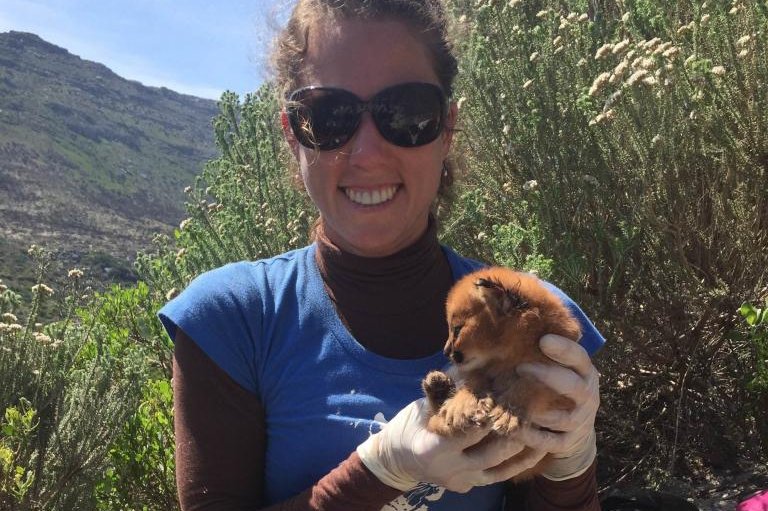Postdoctoral research fellow Laurel Serieys poses with a caracal kitten in Cape Town's Table Mountain National Park. Photo by Laurel Serieys/University of Cape Town
May 20 (UPI) -- Rat poison intended to kill rats in Cape Town, South Africa, is seeping into the surrounding environment and harming local wildlife, including caracals, mongooses, otters and owls.
Scientists at the University of Cape Town measured the levels of rat poison compounds in liver and blood samples from 41 animals in Table Mountain National Park. The tests showed 92 percent of caracals in the park have been exposed to anticoagulant rat poisons. Caracals look similar to mountain lions and are sometimes called African lynx. In total, scientists found 81 percent of tested animals had been exposed to rat poisons.
According to the new study, animals in Table Mountain National Park aren't consuming rat poisons directly. Rat poisons are designed to kill rodents slowly over a period of days. When the rats get sick, they become easy targets for hungry predators. When poisoned rats are eaten, the toxic compounds can travel up the food chain.
"We detected at least one of the four most toxic rat poison compounds, all available in over-the-counter products, in six of the seven species tested," lead researcher Jacqueline Bishop said in a news release.
Researchers found concentrations of rat poisons were highest among caracals living near vineyards.
"Vineyards in Cape Town don't use rat poisons to protect their vines, but they do host restaurants, spas and hotels and occur adjacent to dense residential areas where rat poisons are widely used. Caracals regularly hunt in vineyards and it is here that they are likely to be exposed to poisoned rats, in and around urban structures," Bishop said.
Bishop and her colleagues focused their testing on caracals, but also tested several other species they found hit by cars. Positive tests among otters suggest the toxins are making their way into local waterways.
This isn't the first time scientists have documented the movement of rat poison up the food chain. In California, researchers have measured rat poison toxins in wildlife specimens living near places where illegal marijuana farming is a growing problem. Marijuana farmers use rat poisons to protect their crops.
"There is mounting evidence globally that rat poisons are a critical threat to wildlife, including threatened and endangered species," said researcher Nikola Okes. "To really understand this problem locally has taken support from the public, from South African National Parks and the City of Cape Town in reporting the locations of animals hit by cars so they could be included in our study."
Caracals, the study's main focus, are threatened by habitat loss and poaching. Researchers hope their work, published this week in the journal Science of The Total Environment, will inspire the use of more eco-friendly rodent control methods.
"As consumers, we need more eco-friendly alternatives to rat poison and the simplest solution is well within everyone's reach -- improve the management of waste which attracts rats in the first place," Okes said.















